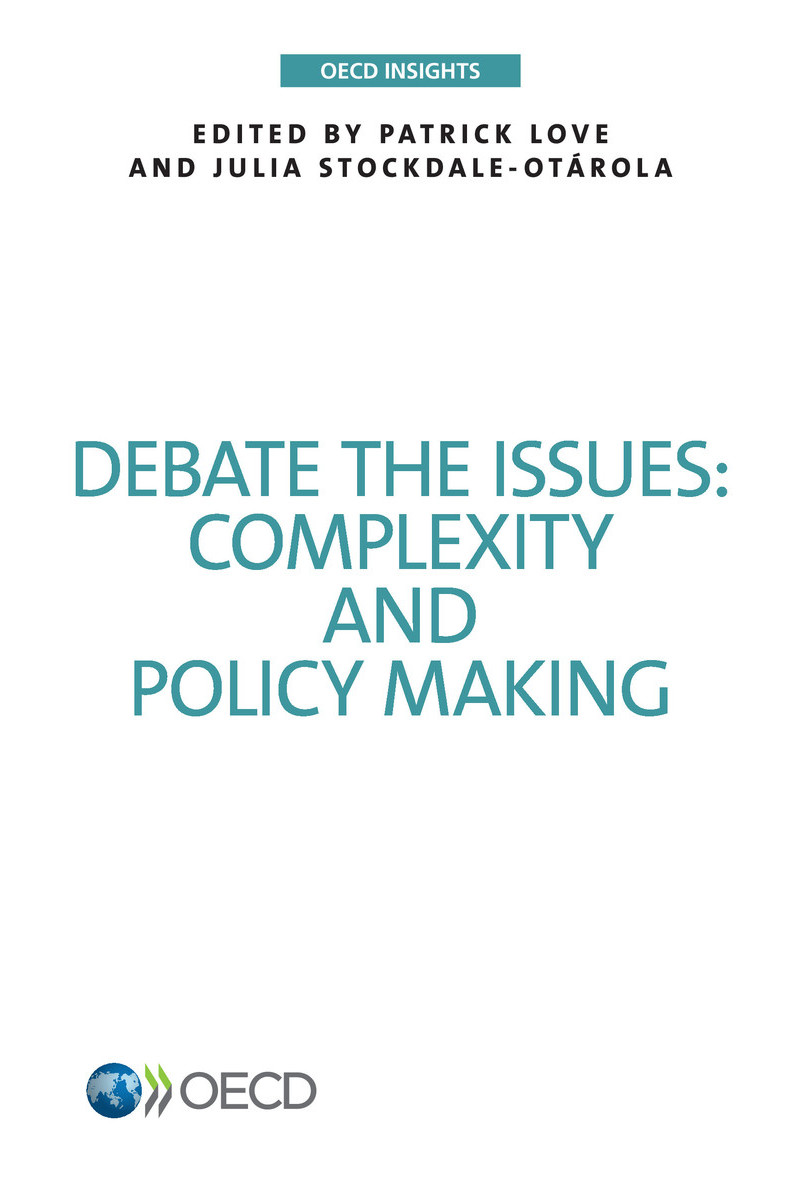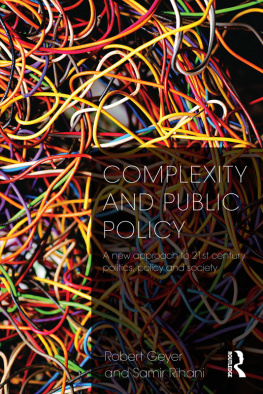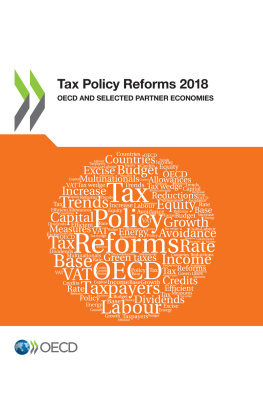coll. - Debate the issues complexity and policy making
Here you can read online coll. - Debate the issues complexity and policy making full text of the book (entire story) in english for free. Download pdf and epub, get meaning, cover and reviews about this ebook. year: 2017, genre: Politics. Description of the work, (preface) as well as reviews are available. Best literature library LitArk.com created for fans of good reading and offers a wide selection of genres:
Romance novel
Science fiction
Adventure
Detective
Science
History
Home and family
Prose
Art
Politics
Computer
Non-fiction
Religion
Business
Children
Humor
Choose a favorite category and find really read worthwhile books. Enjoy immersion in the world of imagination, feel the emotions of the characters or learn something new for yourself, make an fascinating discovery.

Debate the issues complexity and policy making: summary, description and annotation
We offer to read an annotation, description, summary or preface (depends on what the author of the book "Debate the issues complexity and policy making" wrote himself). If you haven't found the necessary information about the book — write in the comments, we will try to find it.
Debate the issues complexity and policy making — read online for free the complete book (whole text) full work
Below is the text of the book, divided by pages. System saving the place of the last page read, allows you to conveniently read the book "Debate the issues complexity and policy making" online for free, without having to search again every time where you left off. Put a bookmark, and you can go to the page where you finished reading at any time.
Font size:
Interval:
Bookmark:

Flicitations et merci davoir tlcharg lun de nos tout nouveaux ePub en version bta.
Nous exprimentons ce nouveau format pour nos publications. En effet, mme si lePub est formidable pour des livres composs de texte linaire, le lecteur peut tre confront quelques dysfonctionnements avec les publications comportant des tableaux et des graphiques tout dpend du type de support de lecture que vous utilisez.
Afin de profiter dune exprience de lecture optimale, nous vous recommandons :
- Dutiliser la dernire version du systme dexploitation de votre support de lecture.
- De lire en orientation portrait.
- De rduire la taille de caractres si les tableaux en grand format sont difficiles lire.
Comme ce format est encore en version bta, nous aimerions recevoir vos impressions et remarques sur votre exprience de lecture, bonne ou autre, pour que nous puissions lamliorer lavenir. Dans votre message, merci de bien vouloir nous indiquer prcisment quel appareil et quel systme dexploitation vous avez utilis ainsi que le titre de la publication concerne. Vous pouvez adresser vos remarques ladresse suivante :
Merci !
Congratulations and thank-you for downloading one of our brand-new ePub-in-beta editions.
We're experimenting with this new format and, while ePub is fantastic for books with linear text, for books with charts, tables and graphs weve found some things may not work perfectly it depends on the device youre using.
So, for an optimal reading experience, we recommend:
- Using the latest version of your devices operating system.
- Reading in portrait mode.
- If large tables are tricky to read, try reducing the text size.
As this is an ePub-in-beta edition, we would be glad to receive feedback on your reading experience, good or otherwise, so we can improve for the future. When writing, please let us know which device/operating system you were using and the title of the publication. Write to:
Thank you!
OECD (2017), Debate the Issues: Complexity and Policy making, OECD Insights, OECD Publishing, Paris, http://dx.doi.org/10.1787/9789264271531-en.

Details of revisions available at: http://www.oecd.org/about/publishing/latestdocuments/Corrigendum_Debate_20the_20Issues-Complexity_and_policy_making.pdf
by Gabriela Ramos, OECD Chief of Staff and Sherpa to the G20
The OECD has prided itself on its essential role in reconciling the economy with nature and society. At present, the global community is failing to fully grasp and advance this fundamental agenda. To do so we need to improve our analytical frameworks, policy tools and models.
The Financial Crisis, almost ten years ago, was a wake-up call on the inadequacies of our policy approaches. But a number of other important trends were also moving in the wrong direction. Perhaps the most serious indictment of our economic approaches has been the emergence and failure of the international community to take serious action on climate change. A related problem is the unsustainable consumption of the Earths resources, currently running at 1.6 planets, i.e. it takes the Earth 1 year and 7 months to regenerate what we use in a year.
Inequality in many OECD countries has also been rising steadily and has now reached critical levels, weakening social cohesion and trust while undermining growth and well-being. The boundless pursuit of increased growth and consumption, the traditional treatment of environmental degradation and income inequality as externalities or marginal market failures and the contention that individuals left to their own devices will self-organise into a socially desirable state have been part of the problem. Simply improving the way markets operate will not solve our pressing problems. Alan Kirman argues that the current paradigm is neither validated by empirical evidence nor does it have sound theoretical foundations.
Economists and policy makers have failed to appreciate the complexity of human behaviour and the systems in which we live. A complexity approach allows us to look at systems of systems consisting of vast numbers of individual elements that interact in complicated ways, such as ecosystems, financial markets, and energy networks, or societal phenomena such as urbanisation and migration.
It also challenges mainstream thinking on key issues. For example, according to the Kuznets curve, income inequality should first rise and then fall as countries income moves from low to high. The empirical evidence however does not seem to bear this out. In this volume, an approach based on economic complexity by Csar Hidalgo and others suggests that inequality depends not only on a countrys rate or stage of growth, but also on its type of growth and institutions.
In economics, we still talk about flows, masses, equilibrium and so on (a gravity model of trade, for example). But these terms are rooted in classical physics, developed before relativity and quantum theory. The new sciences of complexity can provide insights into how groups of people actually behave when they (re)act together to form economic and socio-political systems. These systems do not operate simply as a series of actions and reactions, but with feedback, non-linearity, tipping points, singularities, emergence, and all the other characteristics of complex systems.
Inspired by the OECDs New Approaches to Economic Challenges (NAEC) initiative, this book Debate the Issues: Complexity and policy making provides details of new frameworks that better capture the complexities of modern economies and societies. Our economies are not closed general equilibrium systems; they are complex and adaptive, embedded in specific societies with their own history, culture, and values, as well as in natural environments governed by biophysical laws.
Font size:
Interval:
Bookmark:
Similar books «Debate the issues complexity and policy making»
Look at similar books to Debate the issues complexity and policy making. We have selected literature similar in name and meaning in the hope of providing readers with more options to find new, interesting, not yet read works.
Discussion, reviews of the book Debate the issues complexity and policy making and just readers' own opinions. Leave your comments, write what you think about the work, its meaning or the main characters. Specify what exactly you liked and what you didn't like, and why you think so.















